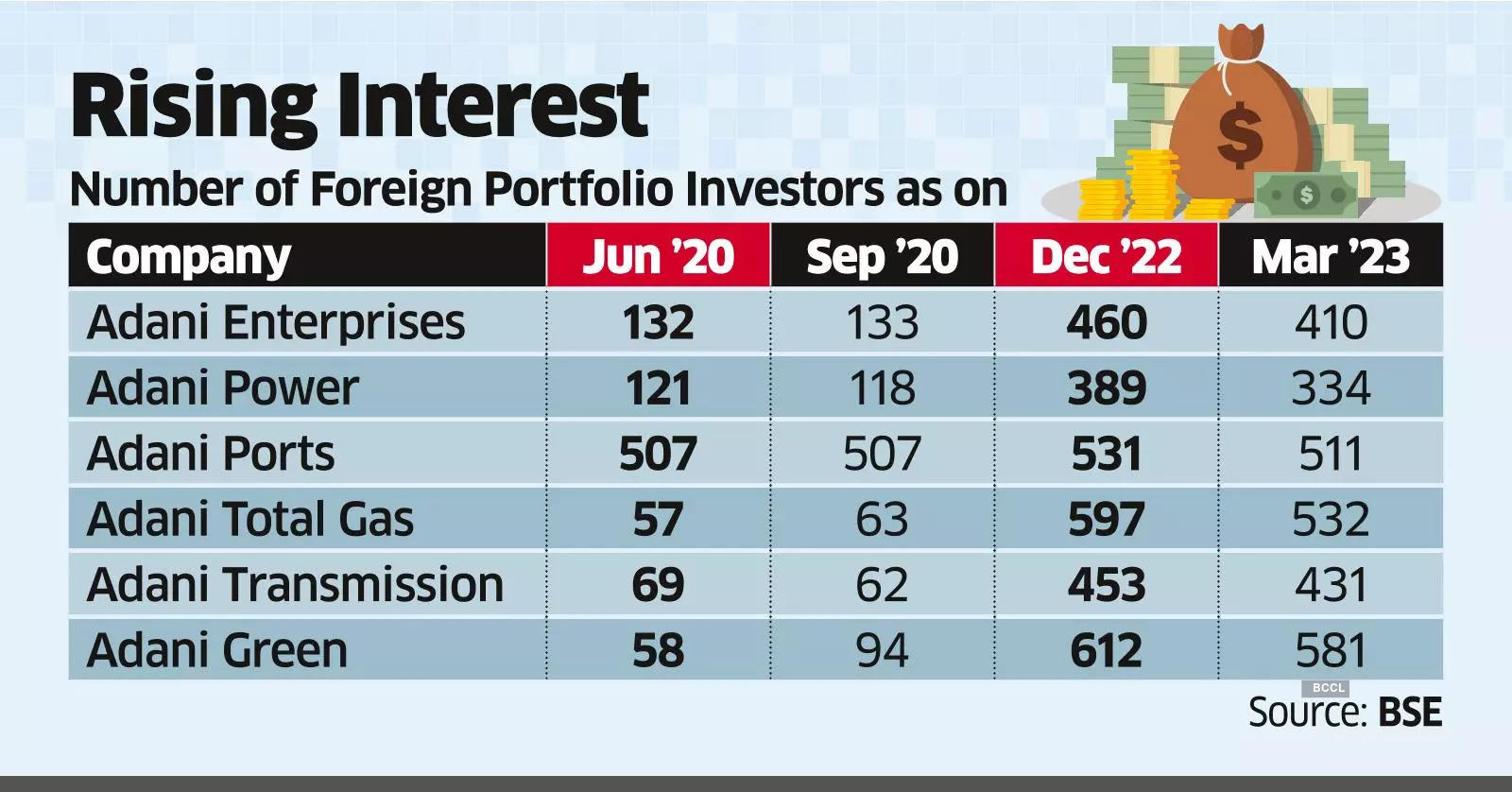A Surge in Foreign Investor Interest Raises Questions for Adani Group Of Companies.
Sebi spots a sudden rush of foreign investor's money into Adani's listed companies; the FPI count in six Adani companies has been on the rise since Sept 2020

An analysis done on the quarterly foreign shareholding trends in the six Adani Group companies—Adani Enterprises, Adani Total Gas, Adani Transmission, Adani Green, Adani Ports, and Adani Power shows a rise in the numbers of FPIs from the September quarter of 2020.
The Adani Group, it seems, has witnessed a sudden influx of foreign portfolio investors (FPIs) in its listed companies since September 2020. The Securities and Exchange Board of India (SEBI) has taken note of this trend, which has raised concerns about potential breaches in overseas investor ownership and minimum public shareholding rules. While the Adani Group denies any wrongdoing, SEBI is conducting a probe into the shareholding patterns of the conglomerate.

Foreign Investor Interest in Adani Group Companies
An analysis of quarterly foreign shareholding trends reveals a significant increase in FPIs across six Adani Group companies, namely Adani Enterprises, Adani Total Gas, Adani Transmission, Adani Green, Adani Ports, and Adani Power. In Adani Enterprises, the flagship entity, the number of FPIs has more than tripled to 410 in March 2023 from 133 in September 2020.
Adani Total Gas, Adani Transmission, and Adani Green have also experienced substantial growth in FPIs, with the numbers rising to 532, 431, and 581, respectively, from significantly lower figures in September 2020.
The holdings of ACC, Ambuja Cements, and NDTV have not been considered, as they were acquired by the Group later, while Adani Wilmar was listed in February 2022.
The securities and Exchange Board of India (SEBI) is considering implementing stricter disclosure requirements for Foreign Portfolio Investors (FPIs) to prevent the misuse of overseas investment channels and address violations of public shareholding norms.
SEBI expressed its concerns in a public discussion paper released on May 31, where it noted that certain FPIs had allocated a significant portion of their equity portfolio to a single investee company or a group of companies.
However, the specific Group or groups were not mentioned in the paper. These proposed measures aim to enhance transparency and prevent potential concentration risks associated with FPI investments.
In May, a six-member expert panel appointed by the Supreme Court to investigate alleged contraventions of securities laws related to the Adani Group reported that SEBI’s probe into the source of funds of foreign institutional investors (FIIs) in Adani-owned entities had yielded no substantial findings.
The panel’s report, submitted on May 6, 2023, expressed suspicions that some public shareholders may not be genuinely independent but could instead be acting as proxies for Adani Group promoters. These findings underscore the need for a thorough examination of the shareholding structure within the Adani Group.
“It has been a long-standing suspicion of Sebi that some of the public shareholders are not truly public shareholders and they could be fronts for the promoters of (Adani) companies,” read the May 6 report submitted by the Supreme Court-appointed panel on the Adani Group.
Examining exchange data, it becomes apparent that several FPIs that appeared in the shareholding lists before July-September 2020 have seen reduced stakes over the past two and a half years. However, it is important to note that the data only includes investors holding 1% or more in a company.
Therefore, it is possible that these FPIs have either exited the Adani Group companies entirely or their holdings have fallen below the 1% threshold.
For example, Albula Investment Fund, based in Mauritius, previously held more than 2% stakes in Adani Enterprises, Adani Green, Adani Total Gas, and Adani Transmission. However, its name has not appeared in the public shareholding lists of these companies since specific quarters in 2021 and 2022. Similarly, Cresta Fund, another Mauritius-based entity, has also seen a decline in its holdings in Adani Group companies.
The Last Bit, The sudden surge in FPIs in the Adani Group’s listed companies has attracted regulatory scrutiny from SEBI.
While the Adani Group denies any wrongdoing, SEBI’s ongoing probe aims to ensure compliance with overseas investor ownership and minimum public shareholding rules.
As the regulator introduces tighter disclosure requirements for FPIs, it seeks to prevent the misuse of investment routes and curb violations of public shareholding norms. The findings of the Supreme Court-appointed panel highlight the importance of thoroughly investigating the shareholding structure within the Adani Group. The evolving ownership patterns and reduced stakes of certain FPIs further emphasize the need for transparency and clarity in the conglomerate’s dealings.



